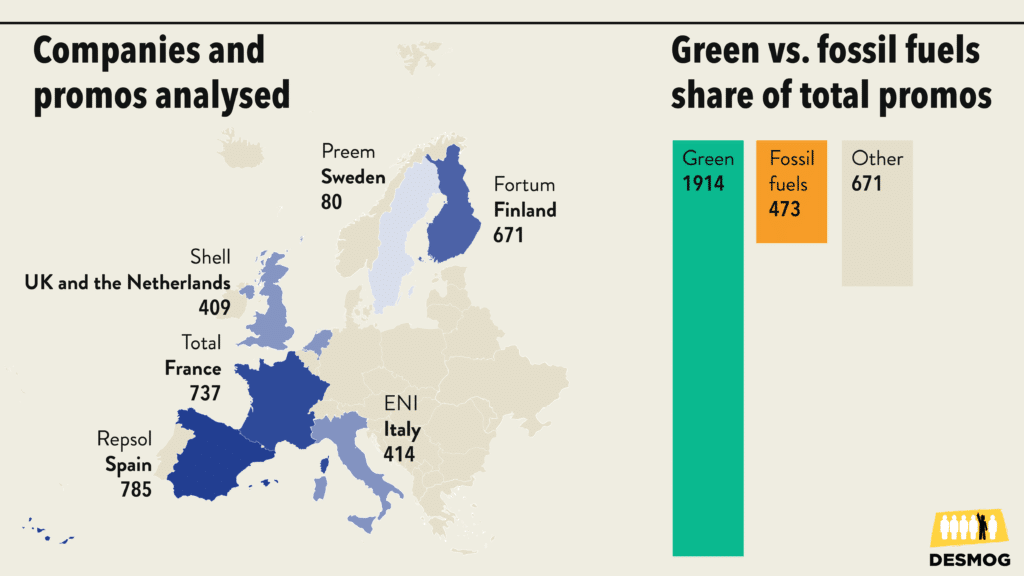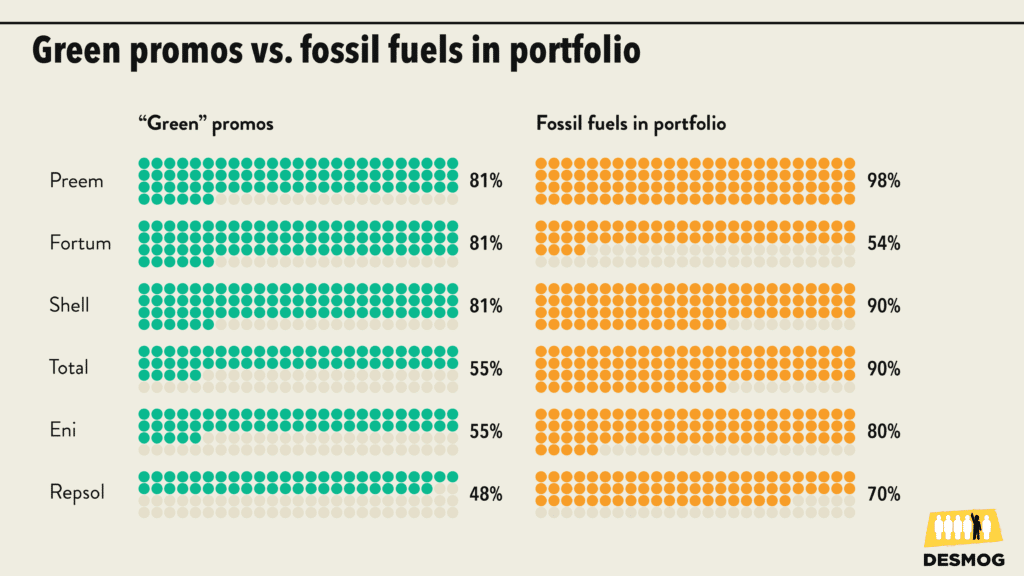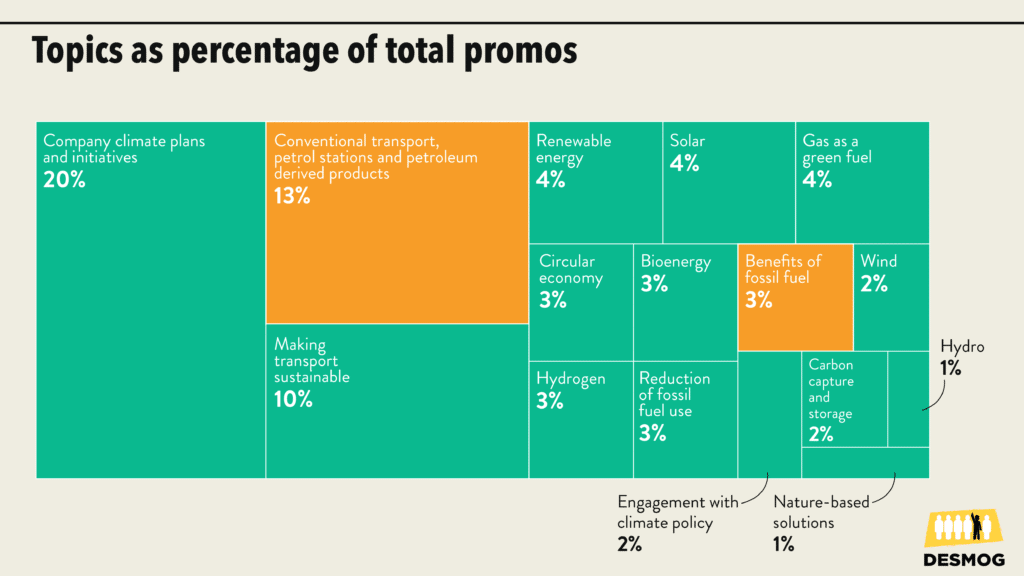Nearly two thirds of social media posts put out by six major European fossil fuel and energy companies since the end of 2019 present a “green” image of the company, despite the majority of their business activity remaining in fossil fuels, reveals new analysis by DeSmog.
The findings add to campaigner concerns that fossil fuel companies are promoting a misleading image of their business models as the need to decarbonize the economy becomes increasingly urgent.
DeSmog’s investigation shows a disproportionate focus on green or environmental efforts by the companies — including highlighting their net zero targets — compared to the share of their business devoted to clean energy.
Available figures compiled from various public corporate reports suggest that on average 80 percent of the businesses’ operations remain in oil and gas and, in one case, coal. The remaining 20 percent represents investments outside of fossil fuels, in areas such as renewables, carbon capture and storage, and research into new green technologies.
The analysis, however, found that 63 percent of the more than 3,000 online posts and videos posted on YouTube, Twitter, and Facebook by Royal Dutch Shell, TotalEnergies, Repsol, Eni, Fortum and Preem between December 2019 and April 2021 presented the energy companies as “green”. Among these posts, 18 percent were publicly designated as advertisements as they appeared on Facebook Ad Library; the number of paid adverts analysed is likely higher overall but YouTube and Twitter do not publicly disclose this information.
Meanwhile, only 16 percent of all online posts and promotions focussed on the companies’ fossil fuel activities, the research found, such as arguing for the need for fossil fuels to ensure energy supplies remain stable, and arguing for their benefits to the economy in developing countries.
“This is greenwashing-101, and it’s utterly misleading,” said Geoffrey Supran, research associate in the Department of the History of Science at Harvard University, reacting to DeSmog’s findings. “Indeed, it’s the very epitome of greenwashing: act dirty, talk green.”
Greenwashing is defined as an umbrella term for the various misleading communications and other corporate practices that “intentionally, or not, induce false positive perceptions of an organization’s environmental performance.”
“That is indisputably what these oil and gas companies are doing when they publicly disguise their fossil fuel-based operations behind a green marketing sheen,” said Supran, who is also director of climate accountability communication at the Climate Social Science Network.

Half of the companies analysed dedicated over 80 percent of their posts to highlighting their involvement in green and climate-friendly work such as building up more renewable energy capacity. Green investments, however, make up just 12 percent of these companies’ portfolios on average based on publicly available figures.
The companies analyzed were selected to represent a range of scale and location across Europe. The ones with the highest share of green promos were Swedish fuels company, Preem, Finnish power company, Fortum, and, Europe’s largest oil company, Shell, all of which presented involvement in what they deemed to be green activities in an average 81 percent of their posts.
“There is a yawning gap between the marketing claims of fossil fuel companies and the reality of their businesses,” said Jonathan White, a lawyer at ClientEarth. “The simple fact is that they are not reducing their polluting activities by the significant amount required to limit the worst impacts of global warming.”
“Just like the tobacco industry did, the fossil fuel industry uses advertisements and promotions to deflect attention away from their harmful business models, deceive the public and politicians with false solutions and ultimately delay climate action,” said Georgia Whitaker, lead campaigner for Fossil Free Revolution at Greenpeace Netherlands. (Note: this research was commissioned by Greenpeace.) “Greenwashing is the new climate denial, and it’s allowing companies responsible for the climate crisis to hide in plain sight.”
The revelations come after several recent rulings against fossil fuel companies’ green ad campaigns for misleading claims about their businesses’ efforts to tackle climate change. Campaigners are also ramping up pressure for stricter regulations on fossil fuel companies, with growing calls for “health warnings” to be placed on fossil fuel company ads in the same way that is required for tobacco companies across much of the world.
“These companies use advertising to distort the public debate, portray themselves as the good guys on environmental issues and to create a ‘social licence’ for themselves – effectively build an aura of respectability around their activities that masks the true nature of the disastrous role they play,” said Barnaby Pace, senior campaigner at Global Witness.
Worst Offenders
Of all the companies analysed in the study, Swedish oil company Preem had the highest discrepancy between the number of online messages promoting a “green” image and the reality of its energy portfolio.
While more than 80 percent of Preem’s posts promoted a green image or highlighted the use of green technology, only 2 percent of the company’s business is outside of fossil fuels, according to figures provided to DeSmog.
Preem had the highest share of promotions focussing on bioenergy out of all six companies analysed, with 23 percent of the company’s posts focussing on this theme. It also had the highest share of posts on carbon capture and storage technologies, with these making up one in five of the promos put out by the company.
A Preem spokesperson said: “We believe that it is relevant and important that we communicate about the strategic decisions that set us apart from others in our industry … We also think it is relevant that we communicate the goals we work towards and the sustainable development that takes place in our company, even though we are fully aware that we have a long way to go.”

Shell, which was identified as the second worst offender in the study, currently channels 90 percent of its long-term investments into fossil fuels, according to recent analysis, and between 2010 and 2018, it was reported to have dedicated just 1 percent of its investments to sources of low-carbon energy such as wind and solar.
However, 13 percent of Shell’s posts focussed specifically on renewable energies such as wind, solar, and hydropower. The company also had the largest share of promos focussing on hydrogen, which made up 11 percent of its total output.
Responding to DeSmog’s findings, a spokesperson at Shell said: “To help alter the mix of energy Shell sells, we need to grow these new businesses rapidly. That means letting our customers know through advertising or social media what lower-carbon solutions we offer now or are developing, so they can switch when the time is right for them.”
The third worst offender in the analysis, Finnish energy company Fortum, generates 54 percent of its energy from fossil fuels, including 9 percent from coal and brown coal (also known as lignite). Coal is the world’s most polluting fossil fuel, and brown coal is the most polluting form of coal, producing up to a third more greenhouse gas emissions per ton than conventional black coal when burnt.
Yet, nearly half (47 percent) of Fortum’s ads and posts focussed on climate-related plans and initiatives, including posts focussing on carbon neutrality and efforts to introduce sustainable heating for homes.
Fortum did not respond to a request for comment in time for publication.
A Focus on ‘Net Zero’
DeSmog’s research found that among the green-focused social media posts, the fossil fuel companies were most likely to talk about their climate plans and initiatives. This included a wide range of strategies and projects, including a large focus on “net zero” targets, which the six companies have all introduced recently.
Net zero targets, however, have been increasingly criticised as an example of “greenwashing” over their potential to mislead the public of the extent of the emissions reductions that some energy companies have promised.

Preem, which is the largest fossil fuel company in Sweden, announced in 2019 its plans to become carbon neutral by 2045. Its efforts to decarbonise rely on increasing its use of biofuels and carbon capture and storage — both of which have been labelled as “false solutions” by campaigners because they still allow for the use of fossil fuels or for emissions to be released.
Pointing to investments in bioenergy, electrification, and carbon capture, a Preem spokesperson said: “The measures we focus on have support in research and national and international regulations and have a positive effect on climate change.”
Shell’s strategy to reach net zero by 2050, which the company announced this February, includes only modest reductions to the company’s oil business, as well as plans to expand its gas business by over 20 percent in the coming years.
The target also relies heavily on offsetting schemes which have been heavily criticised by campaigners who have questioned the effectiveness of carbon credits or forest offsets, which have had mixed success in the past. Guidance on offsetting best practice published by the University of Oxford last year argues that companies should instead “prioritise reducing your own emissions first.”
Eni, Repsol, and TotalEnergies also all aim to become net zero by 2050. French oil giant TotalEnergies, however, plans to increase its fossil gas sales from 33 percent of its sales in 2019 to 50 percent in 2030. Net zero targets for TotalEnergies and Eni, which announced its plans to reach net zero in April 2021, also rely significantly on offsets and carbon capture and storage technology, with Eni arguing it will capture around 90 million tonnes of CO2 by 2050.
TotalEnergies did not respond to a request for comment by time of publication.
In December 2020, Fortum committed to net zero European power generation by 2035, which includes a pledge to increase its solar and wind capacity. However the company has vocally defended the opening of a new German coal plant by its new subsidiary, Uniper, and has publicly endorsed Uniper following legal action taken by the company against a 2030 Netherlands coal phase-out date.
Reacting to DeSmog’s findings, Karen Sokol, a professor at Loyola University New Orleans College of Law, said “the industry’s ‘climate and society friendly’ messaging is nothing new. Rather, it’s just the latest instantiation of its disinformation campaign designed to allow it to continue profiting from deadly and planet-destroying fossil fuel products.”
Moving away from promoting climate denial as the industry did in the past, she said, the fossil fuel industry has now begun “positioning itself, astoundingly, as a climate leader.”
“I believe ‘greenwashing’ tends to minimize the wrongful nature of the industry’s messaging,” she continued. “It is a systematic deceptive marketing campaign designed to interfere with the solution that is necessary to respond to the climate emergency: stopping fossil fuel production,” Sokol said.
New challenges need new solutions. That's why we have developed a new generation of solar technologies 👇 pic.twitter.com/dDXis3oESI
— eni (@eni) January 12, 2021
After net zero targets, posts focussing specifically on renewable energy were the second most prevalent theme among the companies’ “green” online messages, making up 11 percent of all promos analysed overall. Of posts that focussed specifically on one type of renewable energy, companies were most likely to promote their involvement in solar projects.
“These advertisements don’t just promote green efforts; they promote the fossil fuel company too,” said White, calling the companies’ various low-carbon initiatives not much more than “token projects.”
He continued: “The millions spent on sophisticated marketing and advertising campaigns are about shaping public opinion and maintaining demand for fossil fuels. The harmful impact this has on the pace of change – at a time when the need to transition could not be clearer – cannot be underestimated.”
The other major “green” topic that companies promoted was their involvement in efforts to make transport more sustainable. Transport is one of the world’s most emitting sectors overall, making up more than one tenth of emissions worldwide.
Ten percent of posts analysed focussed on transport, with companies showcasing ways they were making vehicles lower-emitting, for example, through rolling out electric charging points or by developing less-emitting petrol and diesel fuels.
Some companies, however, have a mixed track record on this issue. While Repsol appears to support the rollout of electric vehicles, according to InfluenceMap, in a February 2021 EU consultation response by Repsol, the company appears to support a “technology neutral approach to decarbonizing road transport” including considering vehicles that use biofuels or fuels from carbon capture as “zero-emission vehicles”.
A spokesperson for Repsol told DeSmog that while the company supports electrification, “low-carbon liquid fuels — like advanced biofuels and synthetic fuels produced from renewable hydrogen and captured CO2 — are also needed to decarbonize sectors where electrification is not yet an option, such as aviation, maritime, and long-distance road transport, as well as passenger cars and vans where electrification of the whole vehicle fleet will require considerable time.”
Meanwhile, Shell’s support for a transition to electric vehicles runs counter to the American Petroleum Institute’s lobbying against electric vehicles in the United States; despite saying the trade body’s positions on climate are not fully aligned with its own, Shell remains a member of the API.
“There is a yawning gap between the marketing claims of fossil fuel companies and the reality of their businesses.”
Jonathan White, a lawyer at ClientEarth
Other themes identified across the green promos included those highlighting efforts to reduce and recycle waste (3 percent of posts or 98 promos in total). And 54 promos in total (1 percent of all posts) showcased companies engaging positively with legislators and other policymakers on climate change.
Meanwhile, posts that focussed narrowly and specifically on reducing fossil fuels made up 3 percent of all posts analysed.
Controversial Ideas
A significant number of the green-focused social posts were about technologies and fuel sources which, although presented as green and climate-friendly by companies, have been the subject of significant concerns from scientists and activists over their potential to contribute to global emissions.
These technologies, several of which have been labelled as “false solutions” by environmental campaigners, made up 12 percent of promos overall.
“The fossil fuel industry loves pushing technological fixes to the climate crisis that mean that they don’t have to stop using fossil fuels,” said Global Witness’s Pace. “They are nearly always decades away, are vastly expensive or just simply don’t work.”
“The real risk,” Pace continued, “is that governments fall for these false solutions, often deciding to pump huge amounts of money into them that would be better spent on technology we know works such as renewables.”
The most recurring of these posts (making up a total 4 percent of all posts) was natural gas, which, despite being a fossil fuel, has a history of being presented as a bridge fuel towards a cleaner future due to the fact it produces less emissions than other conventional fuels when burnt.
Gas, however, still releases methane and carbon dioxide into the atmosphere, and its extraction leads to further emissions of the potent greenhouse gas methane, which is a more powerful greenhouse gas than carbon dioxide over the first 20 years after being released into the atmosphere. In a blow to the industry, the world’s leading energy analysts recently warned the use of natural gas must be drastically curtailed to meet climate goals.
Eni told DeSmog that gas will “in the long term” account for more than 90 percent of the company’s hydrocarbon production and “will be an important support for intermittent sources in the energy transition.”
A spokesperson for Eni added the company “strongly believ[es] that technology is the only key to face this big challenge, which requires pragmatism in using all the industrial and technological solutions available to set up ad hoc strategies for each Country and Company’s needs.”
Online posts in this category also included attempts by companies to absorb greenhouse gas emissions from the atmosphere, either through man-made technologies, which made up 2 percent of posts, or through so-called “nature-based solutions,” most commonly made up of tree-planting initiatives, which made up 1 percent of promos overall.
While carbon capture and storage (CCS) — either through natural or manmade means — has been highlighted as an important solution in addressing climate change, companies have been criticised for using these technologies to justify continued use of fossil fuels. There are also doubts over the feasibility of rolling out these projects on a large scale.
“In principle, I welcome well-intentioned researchers developing fallback, fill-in-the-gaps technologies like CCS and green hydrogen,” said Supran, who noted that natural gas doesn’t fit into the category because it is “clearly a potent greenhouse gas incompatible with a just and stable future.”
The risk, however, he said is that fossil fuel interests may try to “co-opt” these technologies to “avoid, first and foremost, scaling down fossil fuel production.”
White agreed: “It’s misleading when a fossil fuel company suggests its gas is ‘clean’ and the necessary partner to renewables. It’s misleading when an oil company says planting trees is the way to manage the environmental impact of continuing levels of oil production. And it’s misleading when a company planning to carry on, or grow, its fossil fuel production then flies in the face of climate science to claim that it’s working toward a sustainable future.”
“‘Greenwashing’ tends to minimize the wrongful nature of the industry’s messaging … It is a systematic deceptive marketing campaign.”
Karen Sokol, a professor at Loyola University New Orleans College of Law
Other themes identified in this category were biofuels and hydrogen, which collectively made up 6 percent of all promos.
Proponents of bioenergy argue it is a greener source of power than conventional fossil fuels, chiefly because the plants used in its production absorb carbon dioxide emissions, however, its impact on the climate can vary widely depending on the sources it’s made from, with scientists arguing some forms can be significantly more polluting than fossil fuels.
Hydrogen, meanwhile, has been promoted by many in the energy sector as a clean alternative to gas, as the fuel does not produce any greenhouse gases when burnt. However, activists fear widespread use of the fuel, which is not currently in commercial use, may prolong the use of fossil fuels. There are several ways to produce hydrogen, but almost all of it currently in production uses methane as the feedstock, with non-renewable energy powering that production.
The challenge with companies marketing carbon capture and hydrogen technologies as green, said Supran, is that it risks promoting these options as “(a) silver-bullet techno-fixes that aren’t yet commercially viable and (b) approaches consistent with business-as-usual for oil and gas companies.”
Ultimately, this then allows for the industry to create a “‘Fossil Fuel Savior’ framing of the climate crisis that helps defend the status quo,” he said.
This point was echoed by Sokol, who said: “All technologies that involve continued fossil fuel production — including carbon capture and so-called blue or gray hydrogen — are not merely false solutions. They would accelerate the climate crisis, perpetuate existing and create new harms that disproportionately impact communities who have long been on the frontlines of fossil fuel infrastructure.”
Social Good
While most of the companies’ posts related to their core business in energy, the research revealed that all companies dedicated a significant number of posts (16 percent of all analysed) to emphasising positive involvement in wider social initiatives, not just the environment, including their involvement in schemes relating to diversity, education and training, poverty, and healthcare.
The company with the largest share of ads focussed on its wider social contribution was Italian oil giant Eni, which dedicated 37 percent of its promos to this theme. French oil company, TotalEnergies, also had a heavy focus on social initiatives, dedicating one in five of its online posts to social projects and initiatives such as supporting children’s projects in Africa, and getting more women into science.
Within the social good category, companies’ involvement and sponsorship of recreational activities, and notably sports, was a common theme. This included posts featuring partnerships with renowned sports personalities and brands, and promotion of their sponsorships of sportspeople and teams. Additional research by DeSmog found that five of the six companies (all companies except Fortum) were involved in sports sponsorships overall.
The phenomenon of “sportswashing,” which was originally coined to apply to repressive governments, has been increasingly used with regards to oil and gas companies, who campaigners say use a positive association with sports teams, for example through sponsorships, to deflect from their negative environmental records.
“Sports sponsorships have been part of a broader company communication strategy for a long time,” an Eni spokesperson said. “They cannot be considered neither alternative nor predominant compared to the other communication activities, which are currently focused on describing Eni’s solutions for a low-carbon future or the evolution of retail markets, but are complementary in specific contexts in order to reach different targets and pursue the objectives assigned, both institutional or commercial.”
Meanwhile, a Repsol spokesperson said that the company “has a long-standing commitment to motorsports where it has been sponsoring teams and sportspeople continuously since 1969. We see these partnerships as the best testing ground to develop technologies, solutions, and products and improve key aspects in the fight against climate change, such as energy efficiency.”
A spokesperson from Preem said: “We have chosen to engage in several different activities around our places of business, both to market ourselves and because we want to be an active party in the development of these communities.”
Fossil Fuels
Just 16 percent of posts analysed highlighted the development and use of fossil fuels, the research found, despite these online promotions being most representative of the companies’ activities.
The most prevalent theme in the fossil fuel category was posts promoting a range of products related to conventional transport, which made up 13 percent of all promos (390 posts and videos). This included content promoting petrol and diesel for cars, without any attempts to promote these fuels as climate-friendly, and posts highlighting companies’ petrol stations.
This category also included companies selling other products used for conventional transport, such as lubricants and engine oils. Transport was less likely to be subject to greenwashing than energy, the research found, with more posts simply showing companies’ involvement in conventional forms of transport than green alternatives.
A spokesperson from Shell told DeSmog that while the company invests “billions” in “lower-carbon” energy, “the world will still need oil and gas for many years to come. Investment in them will ensure we can supply the energy people will still have to rely on, while lower-carbon alternatives are scaled up.”
Just 3 percent of promos analysed focussed on the benefits of fossil fuels, either through explicit arguments about their positive contribution to the world, or most commonly, through implicit means, such as through videos showcasing the ingenuity and scale of companies’ oil and gas operations.
“This industry has a proven track-record of acting in bad faith on the climate crisis, and so the onus must be on them to show they are serious about reforming their business practices rather than their propaganda,” said Supran. “This means putting their money where their mouths are. As long as they continue to market themselves as low-carbon, yet invest almost entirely in high-carbon, their ads are, by definition, a distraction from reality that doesn’t deserve to be taken seriously.”
Research by Nadia Feldkircher, Ines Emprin, Charlotta Lahnalahti, Ingvild Deila, Mariangela Castillo, Katherine Besenyei, Bo Frohlich and Kate McMahon.
This research was commissioned by Greenpeace. DeSmog retained full editorial control of the work.
Subscribe to our newsletter
Stay up to date with DeSmog news and alerts







